- Home
- Carl Deuker
Night Hoops Page 4
Night Hoops Read online
Page 4
Her face reddened in anger. "So you're going to let them get away with it? They try to kill you, and you do nothing?"
Scott came to my defense. "Nick's right, Katya. The Dawsons are trouble. You don't want them after you."
She wheeled on him. "And what about the next boy? What if they actually kill the next boy?"
"Katya," Scott said, trying to soothe her. "Nobody is going to get killed."
Katya pointed her finger at me. "He almost got killed! Didn't you hear him! Your own brother! What if this Luke hadn't been there? What then?"
She stared at Scott, stared at him the way a scientist looks at some strange bacteria under a microscope. Then, before Scott answered, she grabbed her clarinet case and stormed out of our house.
Scott started toward the door, stopped, then turned on me. "Thanks a lot, Nick."
"What did I do?" I asked, but he just walked past me and went downstairs.
Dad phoned that night. I was upstairs reading when Mom called up to me. "Hey, Nick," he said when I took the receiver from her. "How are you, Son?"
Hearing his voice made me feel better. I still wasn't used to his being gone, and whenever he didn't call for a while, I started worrying. I knew guys who hadn't seen their dads in years.
He asked how I was doing in school and what my teachers were like. "Look," he said at last, "the Sonics have an intrasquad game Friday night. I've got courtside seats. What do you say? Do you want to go?"
"Yeah," I said instantly. "It sounds terrific."
"Great," he answered, and I could feel the relief in his voice. "Listen. I already talked to your brother, and he's busy, so I've got an extra ticket. If you've got a buddy you'd like to bring along, go ahead and ask him." He paused. "Or her. You got a girl you'd like to bring along?"
I felt myself go red in the face. "No, Dad."
He laughed. "All right. Well, put your mom on now. We've got to work out the details."
After I handed the receiver to Mom, I went downstairs to the den where Scott was watching a Simpson's rerun on the tube—one about the Kwik-E-Mart. We'd laughed a lot the first time we'd seen it, but that evening—while we heard the murmur of Mom's voice on the phone upstairs—neither of us laughed once.
On the telephone Dad's voice had been off somehow, cheerful on top but sad underneath. That's how I felt, too. I'd thought that what I'd wanted more than anything was for Dad to look at me, look hard and long at what I could do, not just glance at me for a second or two before turning back to Scott. I had a feeling that was going to happen now. I was going to get exactly what I'd always wanted.
But I would have given that up if I could have had him living at home again, the way he used to, only without the fighting. I'd have gone back to being the second son for that.
Chapter 2
At school the next day I kept expecting Trent to be around every corner. I don't know what more I thought he was going to do. I didn't really expect him to choke me to death in the hallway in front of a thousand kids. Still, I didn't think he'd tell me how sorry he was and invite me to his birthday party, either.
I didn't see him until P.E. In the locker room he ignored me as we suited up. No threat about how I'd better be watching out, how he was going to finish me off some day. Nothing at all. I breathed a little easier, vowing to myself never to cross swords with him again. He could score all the touchdowns he wanted.
The guy who did talk to me was Luke Jackson, but it wasn't about Zack or Trent or what had happened. As we ran our warm-up laps together, we talked hoops. All through that P.E. class, I thought about my dad's extra ticket and how I owed Luke. At the end of class I asked him if he wanted to go. The answer was immediate. "Sure do. If I'm going to live here I've got to start rooting for the Sonics."
After school on Friday we walked to my house together. When he saw my court, he licked his lips. "How about a little one-on-one while we wait for your dad?"
We played all afternoon. I'd known from gym class that he was good, but now I saw just how good. He was quick, with soft hands and the touch of a natural scorer. He had the attitude of a scorer too. When his shots were dropping, he rebounded and played tough defense. But when he hit a cold spell, his whole game fell apart. He stopped blocking out on rebounds; he stopped hustling after loose balls.
Our games had a crazy rhythm to them. He'd jump out way ahead or he'd fall way behind. Whichever it was, I'd play my steady game, hoping either to catch him when he cooled down or to hold him off when his hot streak came. Sometimes I did; sometimes I didn't.
We'd played a half dozen games before Dad's truck pulled into the driveway. Then the three of us shot around for a little while. In the beginning Dad was unimpressed. Then Luke caught fire and sank about a dozen shots in a row, opening Dad's eyes. "You going out for the Bothell team?" he asked.
"You bet," Luke answered.
My father smiled. "I'll tell you what. I'm jealous of your coach, because I'm looking at two parts of a pretty good-looking team."
Dad and I went inside to tell Mom we were off. Scott was in our downstairs den watching television. I saw Dad look that way, but Scott didn't even come up to say hello. Mom stood in the doorway, her hands on her hips. "I'll have Nick back by eleven at the latest," Dad said.
Mom looked right past him to me. "Have fun."
"I will," I managed.
Things got better once we piled into the truck. The scrimmage was at Seattle Pacific University. We stopped at Kidd Valley for hamburgers, fries, and milk shakes, then hopped on the freeway at 145th for the ride into Seattle. We talked basketball all the way down to the game—pro hoops, college hoops, high school hoops. Luke knew as much about the players and teams as Dad and I did, which made it easy.
You hear you've got courtside seats, and you figure that the seats are really three, or five, or ten rows up. But we sat on folding chairs at mid-court. The Sonics were right there, and I mean, right there.
At the airport I'd once seen the Seattle Mariners. They weren't all that different from other men in the airport. A little bigger maybe, with a little less fat around the gut, and a lot more jewelry around their necks. If I hadn't spotted Ken Griffey Jr., I might not have recognized any of them.
Being close to the Sonics was entirely different. There was no way I wouldn't have recognized them as basketball players. It wasn't just their height, though they were incredibly tall. It was more the muscles. The power forwards, the centers—those guys were absolutely massive. During warm-ups I stared at them, my mouth hanging open. Dad nudged me. "Forget about those big guys, Nick. You can't learn anything from them. Keep your eyes on Gary Payton."
When I was little, Michael Jordan was the player I'd dreamed of being. Me and every other kid in the country. In my closet I had Jordan shoes and a Jordan jersey. But Jordan was too good. I've got some of his games on video. Every once in a while I watch one, hoping to pick up some moves. And sometimes I do, but always from one of his teammates. The things Jordan did—it's as if he was from some other planet. You can't even pretend you can be like him.
Gary Payton has to work to be great. When I watch him, I can visualize myself doing the things he does. Sometimes I'll even stop the cassette and practice one of his moves in the mirror, and then try it out the next time I play.
The Sonics were playing an intrasquad game, not even an exhibition, the Green against the Orange. Half of the players I'd never heard of. "Who are these guys?" Luke asked in a whisper as they warmed up. We were so close he was afraid one of them might hear.
My father leaned toward him. "They're from everywhere. High schools, junior colleges, South America, Lithuania. There are ten guys fighting for one or two spots on the roster. The ones that don't make it will end up in the CBA or in Europe—or back home shooting around at the rec center." My father looked out to the court. "They'll play hard. This is the chance of a lifetime for them."
He was right. Once the game started, it was the no-namers who were flying up and down the court, hurling themsel
ves on every loose ball, crashing the boards. Payton and the other veterans went at a slower pace. The season was weeks away, and they were just loosening up. Sometimes they almost seemed amused by the fury around them.
There was one guard from Tennessee who was really playing super. He wasn't passing the ball much—none of the no-namers were doing much passing—but when he had the ball he made slashing drives to the hole or else pulled up for high arching rainbows from outside the three-point line. If you didn't know better, you'd have thought he was the all-star point guard and that Payton was the nobody hoping to catch on with the team.
Early in the third quarter the Tennessee guy stole the ball on a double-team. He came out of the traffic like a bullet, heading upcourt ahead of the pack.
Or almost ahead of the pack. Payton was the last defender. I figured the Tennessee guy would pull up for a jumper, and that must have been what Payton thought too. Instead, he gave Payton a stutter step, then blew by him and soared for an amazing tomahawk jam. Like the other two thousand or so in the stands, I jumped to my feet and let out a roar.
When we settled back into our seats, Dad leaned over to me. "Mark my words. Payton will make him pay."
All through the third quarter and into the fourth, Payton was almost invisible. He made some nice passes, played some good defense, but you didn't notice him. Then, with about three minutes left and his team down six points, he turned his game up a notch. First he hit a three-pointer, then stole the ball and drove for a thundering jam of his own.
The Tennessee kid suddenly looked rattled. He took an off-balance jumper that missed badly, and Payton brought the ball down with a chance to steal a win.
The seconds were ticking away ... 13 ... 12 ... 11. A couple of guys flashed into the key, but still Payton kept his dribble up top, his eyes locked on the Tennessee kid: 6 ... 5 ... 4. Then Payton made his move. A hard drive to his right, and a lightning-quick crossover dribble that left the Tennessee guy flailing. Payton took the ball hard to the glass, and his scoop lay-in dropped through just as the horn sounded. Everyone was up and cheering, and Payton grinned ear-to-ear right in the face of the Tennessee guy.
After the game we went to Starbucks for muffins and hot chocolate. We sat talking about the game, always coming back to Payton's winning shot. "Talk about knowing how much time is left," Luke said. "Man, he cut that close!"
We finished eating. Dad dropped Luke off and drove me home. When he pulled into the driveway, he turned in his seat to face me. "You saw how Payton played tonight," he said, "how he took the game into his own hands at the end. That's how I want you to play. Pass all you want throughout the whole game, lead the world in assists, make your coach and teammates happy. But when it's crunch time, when the game is on the line, you take the final shot. You understand what I'm saying. You take it."
"I understand, Dad."
He reached over, roughed up my hair. "Good." Then he looked at me. "I miss you, Nick."
That lump came back to my throat. "I miss you too," I said.
He reached across me and opened my door. "You better get inside. We're late, and I don't want your mom to worry."
Chapter 3
Monday at P.E., Mr. Shelly announced that for the next few weeks we'd be playing a basketball tournament. Then he named me as one of the six captains. That pumped me up, because it meant he knew that I'd been a player in junior high. And if he knew about me, then Coach O'Leary, the varsity head coach, knew about me too.
We used the beauty-contest method for picking teams. I picked Luke first. After that I got Leo Devencenzi and Casey Russell, both of whom were okay players and old Canyon Park buddies. The last guy was somebody whose name I didn't know, an uncoordinated kid who had some size.
Shelly went over the rules for the tournament. Basic stuff: Call your own fouls. Captains settle arguments. Then, right before the games started, Coach O'Leary came out of the coaches' office and took a seat on a folding chair under the scoreboard.
O'Leary was huge, six six and probably close to three hundred pounds of muscle and fat. He had thinning red hair and a freckled face and arms. His voice went with his body, a booming voice that filled whatever room he was in and the one next to it. I once watched him order a sandwich at Safeway. "Ahh, put a couple more slices on there, buddy, will you?" O'Leary thundered. The deli man, laughing, obliged with about another half pound of salami.
This was my chance to show O'Leary exactly what I could do. Then came the kick in the face. The team we were playing had Trent Dawson on it.
As soon as Dawson saw the match-up he pointed to me. "I'll take Nick Abbott." I figured he'd really take me, fouling me hard and often. My heart raced. What could I do? If I let him run over me, he'd make me look like a clown in front of O'Leary. But if I called him for fouling me, I'd run the risk of having him come after me again, and I didn't want that.
The amazing thing is, I never had to decide. Not that Trent didn't play hard, because he did. He had a deceptive stutter-step dribble, was fast on his feet and with his hands, and dived after every loose ball as if it were a million dollar bill. When I challenged him by driving to the basket, he made me pay with hard fouls, but I did the same to him. What he didn't do was give me the elbow in the gut or the forearm to the chest that were his trademarks.
With under a minute left we were down by one. The whole game I'd been feeding Luke, and he'd been filling the hoop. But I remembered what my dad had said about crunch time, and I took the game into my hands.
I was dribbling at the top of the key, keeping the ball out of Trent's reach. With my eyes I showed Luke where I wanted the screen. He set it, on Trent's right. Trent felt him there and anticipated my move in that direction. So I faked that way and went the other way. Trent got his feet tangled, and I was in the clear for a pull-up jumper from just outside the free-throw line. No doubt about it. Swish! Right in the heart!
Shelly, standing in center of the huge gym, blew his whistle. "That's it, gentlemen. Shower up!"
As I headed to the locker room, Coach O'Leary crossed over to me. "You're Scott Abbott's brother, right?"
"Yeah. I'm Nick Abbott."
"Well, that was nice clutch shooting at the end there, Nick. Real nice."
"Thanks, Coach," I answered, trying not to smile. "Thanks a lot."
After school Luke came over to shoot around. He was as pumped as I was. "I wonder how many of my pretty jumpers O'Leary saw fall through the net?"
"Quite a few, because of all those pretty assists I fed you."
He laughed. "You don't get an assist unless I make the shot. Remember that, Mr. Point Guard. You need me."
We shot around a little, and then I asked him if he wanted to go one-on-one. He shook his head. "No more of that for a while."
"Why not?"
"You know what this so-called basketball tournament really is? It's a tryout, that's what it is. That's why O'Leary was there today, why he's going to be there every day. The guy will be watching every gym class, picking out his team. So we'd better work on some two-man games, screen and rolls, lob passes over the top, that sort of stuff. We caught his eye today. Now we've got to make sure we keep it."
For the next hour we worked at getting in sync. When you play point guard, it's not enough to hit a guy with a pass, you've got to hit him so that he's in rhythm, so that he can dribble or shoot without a moment's hesitation, without the slightest fumbling for the ball. To do that, you've got to know exactly where he wants the ball and exactly when he wants it. And you've got to have the right amount of zip on the ball, too. You can't be knocking the guy down, or making him wait. The timing has to be perfect, and perfect takes practice.
After an hour of lob passes and skip passes off imaginary pick and rolls, we needed a break. I went inside and brought out a liter of Pepsi. We sat on the back steps and passed the bottle back and forth. The Pepsi was cold and sweet going down.
"That Dawson is a pretty good ballplayer," Luke said.
I took a long swig. "Yeah,
he's tough."
"He's the only guy out there besides you and me who has a chance to make the varsity."
I laughed. "Trent Dawson? He won't turn out for the team. No way."
Luke took the Pepsi from me. "He played pretty hard for someone who's not interested."
My mother's car pulled up. She smiled and waved hello, then went inside. Luke and I were just getting ready to shoot again when the back door popped open. "I'm sorry, Luke, you're going to have go home now. I need to talk to Nick."
Luke's eyebrows raised. He could hear the anger in Mom's voice, see it in her face. "Tomorrow, Nick," he said.
I'd barely made it inside when Mom started waving a piece of paper in front of my nose. "What is this, young man? What is this?"
"I don't know," I answered. "I can't even see it."
She thrust the paper into my face. "All right. See it."
Bothell High sends home midterm grades. They don't really count for anything; they're sort of a preview of coming attractions. What was coming for me was a horror film.
"Four D's," she fumed, her eyes wide with shock. "Four! And in all your important classes. English, history, science, math."
"I'll start studying," I mumbled. "Don't worry."
"You bet you'll start, young man. From now on, when my car pulls into the driveway, Luke goes home and you go upstairs and hit the books."
"But Mom..."
"No buts. You're lucky I'm letting you shoot around at all. If you spent a quarter of the time and energy on schoolwork that you do on basketball, you'd have straight A's."
Chapter 4
I stomped up to my room, but when I cooled off I had to admit she was right. I did have to bring my grades up to C's or I wouldn't be playing on any team—varsity or junior varsity. When I broke the news to Luke the next day, he shrugged, saying, "Won't matter. In two weeks daylight-saving time ends. It'll be too dark to shoot hoops much past five anyway."

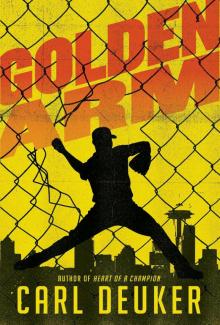 Golden Arm
Golden Arm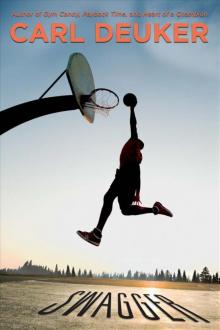 Swagger
Swagger Gym Candy
Gym Candy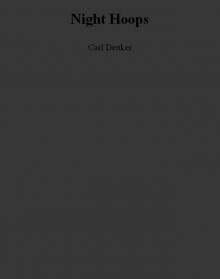 Night Hoops
Night Hoops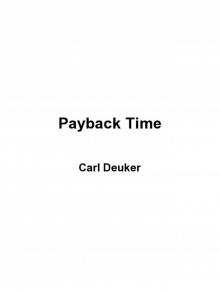 Payback Time
Payback Time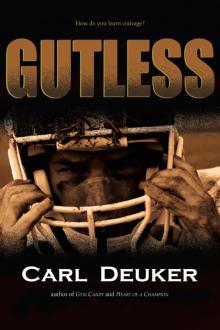 Gutless
Gutless Runner
Runner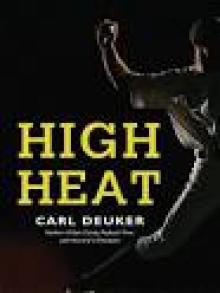 High Heat
High Heat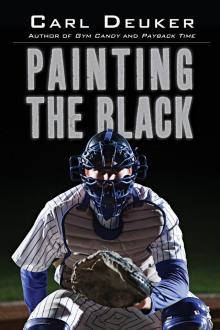 Painting the Black
Painting the Black